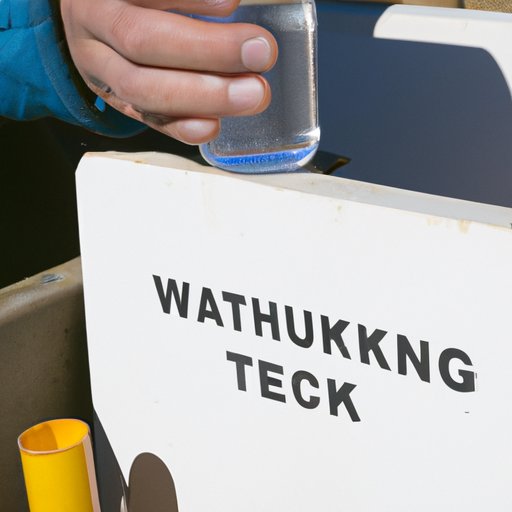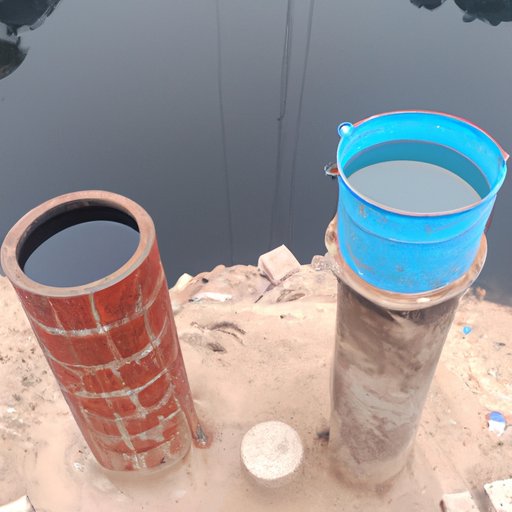Introduction
Well water is a popular choice for those living in rural areas or who want to avoid the costs associated with city water. It’s an abundant and natural resource that many people rely on for their household needs. While well water does come with its own set of responsibilities, it can be a great option for those looking for an alternative to city water.
Overview of Well Water
Well water is any water that comes from a private well or borehole. It is different from city water because it is not treated by a public water treatment facility. Instead, it is drawn directly from the ground and can contain various contaminants and minerals. The quality of well water depends on the location of the well, the type of soil and bedrock around it, and other environmental factors.
Benefits of Well Water
Well water has many advantages over city water. Since it is not treated, it can often taste better than city water. It also doesn’t contain chlorine or other chemicals used to treat city water. Additionally, well water is generally more affordable than city water since there are no monthly bills associated with it. Finally, well water provides a sense of independence and control over one’s water supply.

Testing and Treating Well Water
It’s important to test well water regularly to ensure it meets safety standards and is free from contaminants such as bacteria, nitrates, and arsenic. Most states require that well water be tested every year or two. Homeowners can either hire a professional to test the water or purchase a testing kit to do it themselves. If the water tests positive for any contaminants, homeowners will need to take steps to treat the water.
There are several methods for treating well water, including reverse osmosis systems, ultraviolet light systems, and chemical treatments. Each method has its pros and cons, so homeowners should consult a professional before deciding which treatment method is best for them. Once the water is treated, it is important to test it again to make sure the contaminants have been removed.
Common contaminants in well water include nitrates, bacteria, iron, manganese, and arsenic. Nitrates can occur naturally in the environment and can be dangerous if consumed in high amounts. Bacteria can cause illness if consumed and should be removed through filtration or chlorination. Iron and manganese can give the water a metallic taste and can stain sinks and clothing. Arsenic is a carcinogen and should be removed from the water.

Understanding Your Rights as a Well Water User
As a well water user, you have certain rights and responsibilities. In most states, you have the right to know what is in your water and the right to take legal action if your water is deemed unsafe. You also have the responsibility to maintain and protect your well, test the water regularly, and treat the water if necessary. Additionally, some states have regulations specific to private wells, so it’s important to familiarize yourself with the laws in your area.
Pros and Cons of Using Well Water
Using well water has both advantages and disadvantages. On the plus side, well water is usually cheaper than city water, tastes better, and offers a sense of independence. On the downside, it requires regular testing and can contain contaminants that need to be removed. Additionally, it may be difficult to find a professional to help with maintenance or repairs.
Drilling a Well
If you’re considering drilling a well, there are a few things you should know. First, you need to make sure the area you plan to drill in has enough water and that the water is of good quality. You also need to make sure the area is safe and that the landowner (if applicable) grants permission to drill. Finally, you need to find a professional to do the drilling. The cost of drilling a well varies, but it typically ranges between $2,000 and $15,000.

Comparing Well Water to City Water
When it comes to comparing well water to city water, there are several differences. Well water is not treated and may contain contaminants, while city water is treated and regulated by state and federal agencies. Well water may also taste better than city water, but it may be harder to locate a professional to help with maintenance or repairs. Ultimately, the choice between well water and city water depends on the individual’s needs and preferences.
Conclusion
Well water can be a great source of clean drinking water. It is usually cheaper than city water, tastes better, and offers a sense of independence and control over one’s water supply. However, it requires regular testing and can contain contaminants that need to be removed. Additionally, it may be difficult to find a professional to help with maintenance or repairs. Ultimately, the benefits and drawbacks of using well water depend on the individual’s needs and preferences.
(Note: Is this article not meeting your expectations? Do you have knowledge or insights to share? Unlock new opportunities and expand your reach by joining our authors team. Click Registration to join us and share your expertise with our readers.)
